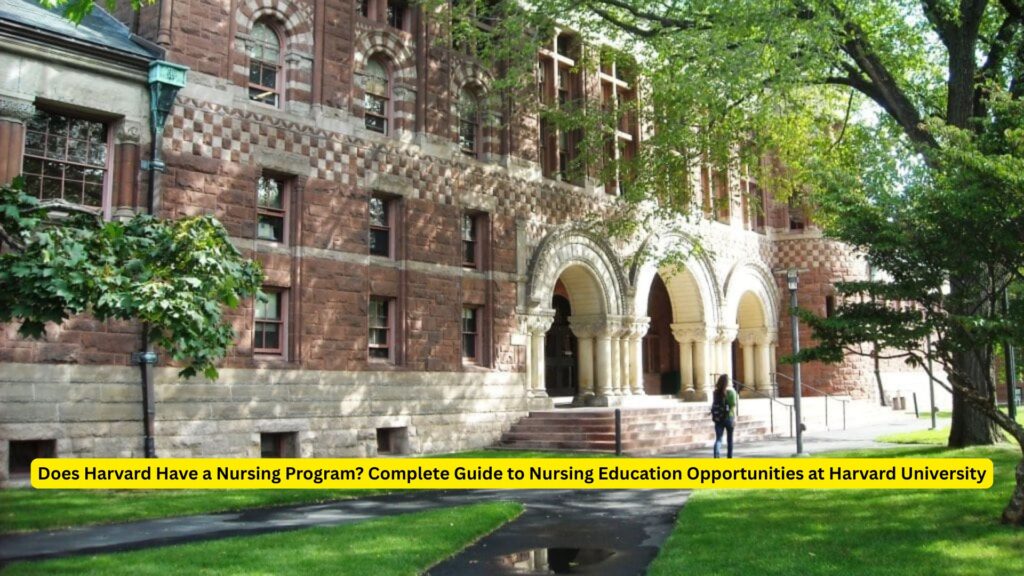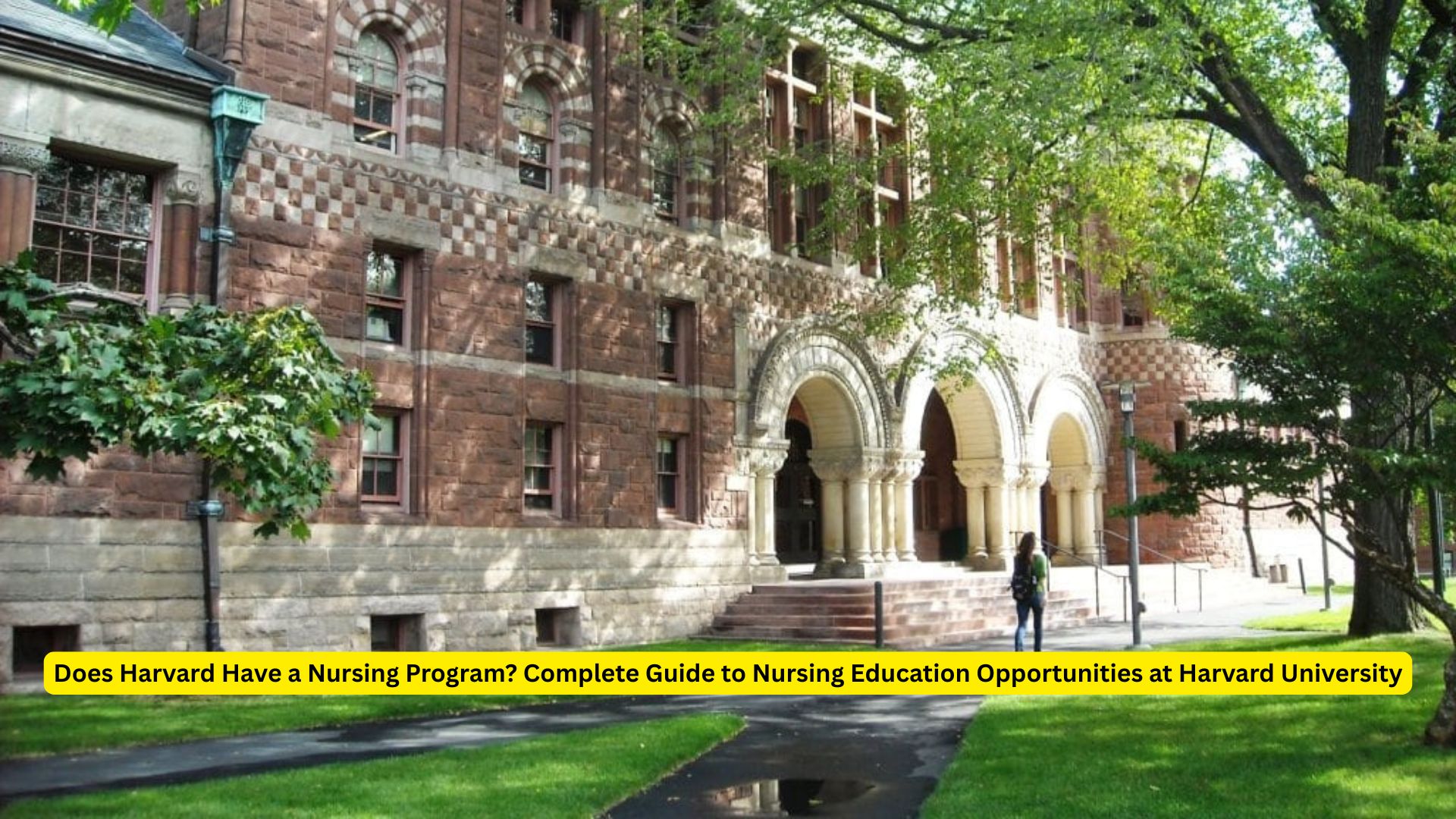Does Harvard Have a Nursing Program? Harvard University, located in Cambridge, Massachusetts, is renowned worldwide for its academic excellence, groundbreaking research, and leadership in higher education. Students from across the globe dream of studying at Harvard to gain access to some of the best professors, resources, and career opportunities. However, one question that often arises among aspiring healthcare professionals is — “Does Harvard have a nursing program?”
While Harvard University does not have a traditional undergraduate nursing school like many other universities, it plays a vital role in the field of healthcare, nursing research, and leadership through its Harvard T.H. Chan School of Public Health, Harvard Medical School (HMS), and Harvard-affiliated hospitals such as Massachusetts General Hospital (MGH) and Brigham and Women’s Hospital.

In this comprehensive article, we’ll explore whether Harvard offers nursing programs, what options are available for aspiring nurses, how Harvard contributes to the nursing profession, and how you can pursue nursing-related education or research at this world-class institution.
Does Harvard University Offer a Nursing Program?
Harvard University does not offer a Bachelor of Science in Nursing (BSN) or traditional clinical nursing degree like those provided by dedicated nursing schools such as Johns Hopkins, Yale, or the University of Pennsylvania.
However, Harvard offers advanced programs and opportunities for nurses and healthcare professionals who wish to specialize in public health, healthcare management, policy, or research.
Most nursing-related education at Harvard takes place through the following institutions:
- Harvard T.H. Chan School of Public Health (HSPH)
- Harvard Medical School (HMS)
- Harvard Graduate School of Education (HGSE) (for nurses interested in teaching or leadership)
- Harvard-affiliated hospitals that provide research and post-graduate fellowships for nurses
Therefore, while Harvard does not have a traditional nursing program, it offers pathways for advanced practice nurses, nurse leaders, and healthcare professionals to enhance their knowledge in public health, management, and global health systems.
Harvard’s Role in Nursing Education and Research
Even though Harvard does not grant undergraduate nursing degrees, its influence in nursing research and policy-making is significant.
a. Harvard’s Public Health Contribution
Through the Harvard T.H. Chan School of Public Health, the university trains many nurse leaders in areas such as:
- Epidemiology and biostatistics
- Health policy and management
- Global health
- Environmental health
- Health economics
Many registered nurses (RNs) and nurse practitioners (NPs) enroll in Harvard’s Master of Public Health (MPH) or Doctor of Public Health (DrPH) programs to expand their leadership and research skills.
b. Harvard Medical School Collaboration
Harvard Medical School collaborates closely with Massachusetts General Hospital (MGH) — one of the top hospitals in the United States and home to the MGH Institute of Health Professions, which offers accredited nursing programs (BSN, MSN, and DNP).
Thus, while the nursing degree is granted by the MGH Institute, students benefit from the academic ecosystem of Harvard-affiliated hospitals and research networks.
c. Nursing Research and Leadership
Harvard faculty members frequently engage in interdisciplinary healthcare research that directly impacts nursing practice, including studies on patient safety, chronic disease management, healthcare delivery, and global health systems.
Many nurses also pursue research fellowships, executive education, and leadership programs through Harvard’s healthcare and management schools.
Harvard-Related Nursing Pathways
Aspiring nurses or current healthcare professionals can engage with Harvard in several ways:
a. Master of Public Health (MPH)
The Harvard T.H. Chan School of Public Health offers an MPH program that accepts nurses, physicians, and healthcare workers. Nurses can choose concentrations like:
- Health Policy
- Global Health
- Social and Behavioral Sciences
- Epidemiology
This program is ideal for nurses aiming to become public health leaders, researchers, or policy-makers.
b. Doctor of Public Health (DrPH)
The Doctor of Public Health (DrPH) program at Harvard trains experienced professionals — including nurses — to take on leadership roles in public health systems, academia, and global organizations.
c. Executive Education Programs
Harvard offers short-term executive education courses for healthcare leaders through:
- Harvard T.H. Chan School of Public Health
- Harvard Kennedy School (HKS)
- Harvard Business School (HBS)
These programs focus on healthcare strategy, innovation, and management — valuable skills for nurse administrators and executives.
d. Harvard Extension School
The Harvard Extension School provides flexible, part-time programs and online courses in healthcare management, bioethics, and medical sciences — ideal for working nurses looking to strengthen their academic background.
e. Harvard-Affiliated Hospital Programs
The Massachusetts General Hospital (MGH) Institute of Health Professions, an affiliate of Harvard, offers:
- Bachelor of Science in Nursing (BSN)
- Master of Science in Nursing (MSN)
- Doctor of Nursing Practice (DNP)
- Accelerated Direct-Entry Nursing programs
These programs combine rigorous nursing education with clinical training at Harvard-affiliated hospitals.
Admission Requirements for Nursing-Related Programs at Harvard
Since Harvard does not have an undergraduate nursing degree, admission depends on the specific program you apply for. Below are general eligibility criteria for nurses applying to advanced or related programs:
| Program Type | Eligibility Requirements |
|---|---|
| MPH / DrPH (Harvard T.H. Chan School) | Bachelor’s degree, relevant work experience in healthcare or public health, GRE/GMAT scores (optional for some programs), English proficiency (TOEFL/IELTS for international students). |
| Executive Education | Mid- to senior-level professionals in healthcare or management roles; no formal degree required for some courses. |
| Harvard Extension School (Healthcare Programs) | High school diploma, transcripts, and English proficiency; open enrollment for many courses. |
| MGH Institute Nursing Programs | Bachelor’s degree, prerequisite science courses, transcripts, recommendation letters, GRE (optional), and clinical experience. |
Applicants are encouraged to demonstrate leadership in healthcare, passion for patient care, and a commitment to improving public health outcomes.
Tuition and Financial Aid
Tuition at Harvard varies by program and school. Below is a general estimate for nursing-related education paths:
| Program / School | Estimated Annual Tuition (USD) |
|---|---|
| Harvard T.H. Chan School of Public Health (MPH) | $78,000 |
| Doctor of Public Health (DrPH) | $80,000 |
| Harvard Extension School (Health-related master’s) | $36,000–$45,000 |
| Executive Education (Short-term) | $2,000–$15,000 per course |
| MGH Institute of Health Professions (BSN / MSN / DNP) | $50,000–$65,000 |
Harvard provides need-based financial aid, scholarships, and fellowships for qualified students. External funding sources are also available for nurses pursuing public health or leadership degrees.
Career Opportunities After Studying at Harvard
Graduates of Harvard’s nursing-related programs pursue careers in various fields, including:
- Healthcare Administration — Hospital or department leadership roles
- Public Health Leadership — Government and international health organizations
- Policy and Advocacy — Developing health policies to improve patient outcomes
- Education and Research — Teaching and conducting health systems research
- Clinical Leadership — Advanced practice and evidence-based care in hospitals
Harvard-trained healthcare professionals often become executive leaders, global health experts, and educators who influence healthcare delivery at both national and international levels.
Harvard’s Impact on Nursing and Global Health
Harvard University has played a major role in advancing healthcare and nursing globally through:
- Interdisciplinary Research: Collaborations between the Harvard T.H. Chan School of Public Health, Harvard Medical School, and MGH improve patient safety, clinical outcomes, and healthcare systems.
- Policy Development: Harvard experts often advise international organizations like the WHO, CDC, and UNICEF on global nursing and healthcare standards.
- Leadership Training: Thousands of healthcare professionals, including nurses, have undergone leadership and management training at Harvard.
While Harvard may not directly train nurses in clinical practice, its research, policy influence, and health education programs deeply shape modern nursing and healthcare leadership.
Alternative Pathways for Nursing Aspirants
Students who wish to become registered nurses but still want to connect with Harvard’s ecosystem can consider the following routes:
- Complete a Nursing Degree (BSN/MSN) at Another Institution
– After earning a clinical degree, apply to Harvard for an MPH, DrPH, or executive healthcare leadership program. - Enroll at MGH Institute of Health Professions
– As a Harvard-affiliated institution, MGH Institute offers direct-entry nursing programs that combine clinical training and academic excellence. - Take Harvard Extension or Online Courses in Health Management
– Build academic credentials with flexible, affordable online courses while continuing clinical work.
Important Links and Information
| Category | Details / Links |
|---|---|
| University Name | Harvard University |
| Location | Cambridge, Massachusetts, USA |
| Primary Schools Involved | Harvard T.H. Chan School of Public Health, Harvard Medical School |
| Harvard Affiliated Nursing Institution | MGH Institute of Health Professions |
| Undergraduate Nursing Degree | Not offered |
| Graduate Nursing/Health Programs | MPH, DrPH, Health Management, Executive Programs |
| Financial Aid | Need-based and fellowship opportunities |
| Official Website | https://www.harvard.edu |
| Public Health School | https://www.hsph.harvard.edu |
| MGH Institute of Health Professions | https://www.mghihp.edu |
FAQ about Does Harvard Have a Nursing Program?
Does Harvard have a nursing school?
No, Harvard does not have a traditional nursing school or offer an undergraduate nursing degree. However, nurses can pursue graduate-level programs and healthcare leadership courses at Harvard’s public health or medical schools.
Can nurses study at Harvard?
Yes. Registered nurses can enroll in programs like the Master of Public Health (MPH), Doctor of Public Health (DrPH), or executive leadership programs at Harvard.
What is the MGH Institute of Health Professions?
The MGH Institute of Health Professions is a Harvard-affiliated institution that offers nursing degrees (BSN, MSN, DNP) and clinical training at Harvard’s partner hospitals.
Can I become a nurse by studying at Harvard?
No. Harvard does not train nurses for clinical practice. To become a registered nurse, you need a BSN or equivalent degree from a nursing-accredited institution.
Does Harvard offer online programs for healthcare professionals?
Yes. Harvard Extension School and Harvard T.H. Chan School of Public Health offer several online and hybrid programs in health management, ethics, and public health.
Are Harvard’s health-related programs accredited?
Yes. All Harvard schools, including the T.H. Chan School of Public Health, are fully accredited and recognized worldwide.
What is the tuition fee for Harvard’s health programs?
Tuition varies by program but typically ranges from $36,000 to $80,000 per year, depending on the degree and school.
Does Harvard provide scholarships for nurses?
Yes. Financial aid and fellowships are available based on need and academic merit.
Can international students apply for Harvard’s nursing-related programs?
Yes. Harvard welcomes international applicants and provides support through its international student office.
Which Harvard program is best for nurses?
The Master of Public Health (MPH) at the Harvard T.H. Chan School of Public Health is the most suitable program for nurses seeking leadership and research advancement.
Conclusion
In summary, Harvard University does not offer a traditional nursing program, but it provides a wide range of opportunities for nurses and healthcare professionals to advance their education and leadership skills.
Through the Harvard T.H. Chan School of Public Health, Harvard Medical School, and Harvard-affiliated hospitals, the university contributes immensely to the global healthcare and nursing landscape. Nurses can pursue degrees in public health, policy, management, and research, allowing them to influence healthcare systems worldwide.
Harvard’s role in nursing may not be direct, but its influence is profound. It trains nurse leaders, researchers, and policymakers who go on to shape the future of healthcare on a global scale. For nurses seeking to move beyond bedside care into leadership, research, and public service, Harvard offers the perfect platform to redefine their careers and make a lasting impact on the world.

